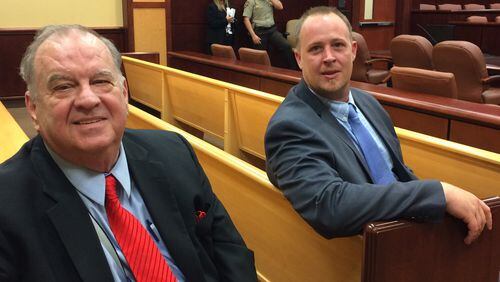The story so far
Earlier: Judge Brenda Weaver has been involved in a controversy in which a newspaper publisher was indicted after he made an open records request.
The latest: The judge has resigned as chair of the state Judicial Qualifications Commission.
What's next: An acting chairwoman will lead the commission until the JQC can elect a replacement.
A North Georgia judge resigned as chair of the state Judicial Qualifications Commission on Friday after she endured weeks of harsh criticism for pushing to indict a weekly newspaper publisher.
Brenda Weaver, chief judge of the Appalachian Judicial Circuit, decided to step down amid reports this week that a federal grand jury is investigating office bank accounts used by the judges in that circuit.
In an email to Judicial Qualifications Commission members, Weaver did not reference the controversy around the indictment of Fannin Focus publisher Mark Thomason and the newspaper's lawyer, Russell Stookey, or her request that the felony charges be dropped three weeks later. Nor did she mention the pending JQC investigation against her or the federal inquiry into her office finances.
Weaver said that without the the time-consuming duties of head of the JQC, she would now have more time for the drug and veterans’ accountability courts over which she presides in the three-county circuit.
“I sincerely appreciate the opportunity I was given to serve as a member and as the chairperson of this commission,” Weaver wrote. “The work of this commission is extremely important and nothing and no one should distract from its duties and responsibilities.”
For several weeks, Weaver has suffered criticism for pushing District Attorney Alison Sosebee to bring felony charges against Thomason and Stookey after the two asked for public records on the judges' office accounts.
In his open records request, Thomason asked to see copies of checks that had been “illegally cashed.” The request angered Judge Weaver, who persuaded Sosebee to pursue an indictment of Thomason on a charge of making a false statement in his open records request. In addition, Weaver asked Sosebee to indict both Thomason and Stookey on identity theft charges — she claimed the two were trying to commit fraud when they asked for copies of checks.
Both men were arrested and jailed overnight.
Weaver said in an interview later that she asked for the indictment because she didn’t like it when her honesty was questioned.
Two weeks after that, however, Weaver asked Sosebee to drop the charges. The case was dismissed July 18 after an unusual hearing before a visiting judge.
This week, The Atlanta Journal-Constitution reported that a federal grand jury had served a subpoena for Sosebee’s file on Thomason and Stookey. The federal investigation concerns a check for $15,691 drawn on the account assigned to former Superior Court Judge Roger Bradley, according to people familiar with the investigation. They requested anonymity because grand jury proceedings are secret.
At the same time, several complaints against Weaver have been filed with the JQC, which investigates allegations of judicial impropriety and has the authority to remove judges.
In July, the Georgia chapter of the Society of Professional Journalists filed one of those complaints, accusing Weaver of inappropriately trying to silence a critic.
“We live in the United States of America where we are blessed to have the protections of the First Amendment,” the chapter said in a statement. “While we are certain Judge Weaver is an elected official in the United States, we are unsure if she is aware of it. Her reaction is more in line with that of a petty dictator, not a judge obligated to uphold the laws of this state and this nation.”
News of her resignation brought varied responses.
“I believe that she has taken the appropriate action considering the JQC is the agency that controls judges statewide,” Thomason said of her resignation from the commission. “It still does not excuse or justify other actions that have occurred. Weaver should also immediately announce resignation from the bench so that another innocent person won’t have to suffer from her influence over the district attorney and (other) judges.”
Stookey also said Weaver should resign from the court, where she has presided for 20 years. “You’ve got to restore the integrity of the bench.”
JQC member Richard Hyde praised Weaver.
“Judge Brenda Weaver is a true public servant who has given many years of service to the people of our state,” Hyde said in a statement sent via text message. “She has shown outstanding leadership by putting the interest of the public above her own.”
The vice chair of the commission, Fulton County State Court Judge Patsy Porter, will be acting chairwoman until the JQC can elect a replacement. She will be the JQC’s third chair in less than six months
Weaver took the position when attorney Lester Tate resigned as chairman in April, saying outside political forces were trying to undermine the JQC. Early this month, Mark Dehler, the director who oversees the day-to-day affairs of the agency, announced his resignation, effective this coming Tuesday. This fall, voters will be presented with a constitutional amendment that would abolish and remake the JQC.
That JQC complaint against Weaver has created a quagmire of potential conflicts. Under the commission’s own rules, current members must recuse themselves from a case when their impartiality might be reasonably questioned. A complaint against a fellow or former commission member appears to meet that condition.
To address that, the commission recently appointed Ben Easterlin, an Atlanta lawyer and one-time JQC chairman, to oversee the complaints against Weaver, according to lawyers familiar with the appointment. When contacted this week, Easterlin, a partner with King & Spalding, declined to comment.
But if the complaints against Weaver move forward, it appears likely that all of the remaining six members of the commission will have to recuse themselves from hearing it and be replaced by temporary members.
The Georgia Supreme Court must also appoint a judge to succeed Weaver on the commission.






